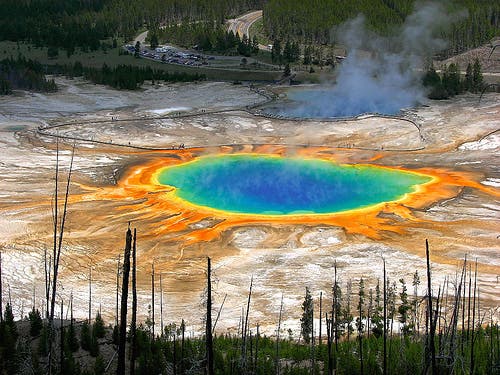 |
| The grand prismatic spring, a seething pool of chemical reactions and bacterial colonies is perhaps the closest we will ever get to the primordial soup in nature |
A team of scientists, led by David Dreamer from UC Santa Cruz, decided that they would test this theory. A recent study suggested that the first life forms arose in pools near volcanoes. Therefore they began looking at geothermal pools around the world, studying the rich mix of chemicals within, looking for organic molecules present in life and the various reactions which fuel it. According to Deamer, the problem doesn't lie with the salt per se.
 |
| Lather similar to this could have acted as the very first cell membranes |
It is a popular theory that such a sophisticated structure was not present in the first ever life forms. Instead the first DNA, RNA and other biological machinery would have formed inside tiny cavities called vesicles within volcanic rocks such as pumice or clays. The rocky shell would have acted like a temporary casing before a simple membrane similar to lather took over. A problem arises because the calcium and magnesium ions bond with the lipids preventing them from forming lather.
Life, of course, is not contained within soap bubbles; and it eventually evolved a salt-proof shell. The best way to form these saline resistant membranes is through a series of complex reactions driven by a group of proteins called enzymes. As enzymes are biological molecules, they are easily damaged in environments that are too hot or too high or low in pH. Marine environments are often acidic and this acidity causes problems for enzyme-driven reactions, meaning it would have been very hard for cells to evolve such membranes.
This led Deamer to suggest that the primordial soup was initially salt free (salt is a very important chemical for maintaining the fluid equilibrium within cells and therefore would be required later down the line). 'I certainly would not claim that life began in distilled water. It's just that seawater is too much of a good thing.' The only remaining question is where such freshwater pools could have existed on Earth billions of years ago. Again, the answer may lie with volcanoes.
Heat would have evaporated pools of salty water, leaving behind the salt. The water would have condensed. Volcanic heat would cause water to evaporate and condense again in what is known as a wet and dry cycle. This would have formed pools of freshwater with a low ion concentration. To test this, Deamer set up an experiment to mimic the volcanic pools by placing test tubes containing freshwater and organic molecules in a 60 degree Celsius environment.
Not only did the lipids organise into membrane-like structures, the results of the experiment showed that they may also help drive DNA replication, one of the most fundamental processes in biology. Seawater would have been just too reactive to enable the creation of life. Heated freshwater containing trace amounts of ions would have provided a perfect environment. Geothermal and volcanic areas would have created such pools, potentially leading to the origins of life.